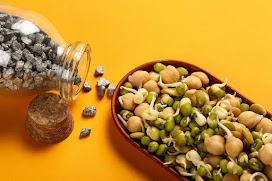Although there is no official scientific definition for superfoods, they are widely recognized for their exceptional nutritional value. In this article, we will explore what makes a food "super," the key benefits of superfoods, and some popular examples.
What Defines
A Superfood?
Superfoods
are typically rich in essential nutrients, including vitamins, minerals,antioxidants, fiber, and healthy fats. These foods provide more nutrients per
serving than other typical food choices, allowing individuals to obtain
multiple health benefits from small amounts. While most whole foods contain
essential nutrients, superfoods stand out due to their high concentration of
these beneficial components.
Many
superfoods also contain compounds that help combat irritation and oxidative
stress, which are associated with chronic diseases like heart disease,
diabetes, and cancer. Antioxidants, for instance, neutralize free
radicals—unstable molecules that can damage cells and contribute to aging and
disease development.
Health Benefits Of Superfoods
- Enhanced Immunity: Superfoods like berries, leafy greens, and citrus fruits are loaded with vitamins such as vitamin C, vitamin E, and other immune-boosting compounds. These nutrients play a crucial role in supporting the body’s natural defense mechanisms, helping to ward off infections and illnesses.
- Reduced Inflammation: Inflammation is a natural response to injury or infection, but chronic inflammation is linked to many diseases. Superfoods such as turmeric, ginger, and fatty fish are known for their anti-inflammatory properties. They contain bioactive compounds like curcumin (found in turmeric) and omega-3 fatty acids (found in fish) that reduce inflammation in the body.
- Improved Heart Health: Heart disease is one of the leading causes of death worldwide, but superfoods can help promote heart health. Foods like oats, flaxseeds, and berries cover fiber, healthy fats, and antioxidants that lower cholesterol levels, regulate blood pressure, and reduce the risk of heart disease. For example, oats are rich in beta-glucan, a type of soluble fiber that helps lower bad cholesterol levels.
- Better Digestive Health: Many superfoods are high in fiber, which is essential for maintaining good digestive health. Fiber helps regulate bowel movements, prevent constipation, and support a healthy gut microbiome. Chia seeds, flaxseeds, and legumes are excellent sources of dietary fiber that aid digestion.
- Weight Management: Superfoods can also be helpful for weight management. Foods like avocados, chia seeds, and green tea help regulate appetite, enhance metabolism, and promote fat burning. For instance, the high fiber content in chia seeds makes you feel fuller for longer, reducing the likelihood of overeating.
- Mental Health Support: Certain superfoods can boost brain function and support mental health. Blueberries, walnuts, and dark chocolate are rich in antioxidants and healthy fats that improve cognitive function and protect the brain from oxidative damage. Omega-3 fatty acids found in fatty fish like salmon are especially beneficial for brain health, reducing the risk of depression and cognitive decline.
Popular Superfoods
- Blueberries: Known for their high antioxidant content, blueberries are packed with vitamins C and K, as well as fiber. They help improve brain function, promote heart health, and reduce oxidative stress.
- Kale: A leafy green vegetable, kale is a nutritional powerhouse that covers high levels of vitamins A, C, and K, as well as fiber and antioxidants. It’s known for its anti-inflammatory properties and supports detoxification.
- Salmon: Rich in omega-3 fatty acids, salmon is excellent for heart health, reducing inflammation, and promoting brain function. It’s also a great source of high-quality protein.
- Chia Seeds: These tiny seeds are packed with fiber, protein, and omega-3 fatty acids. They support digestive health, help regulate blood sugar levels, and promote weight management.
- Turmeric: This bright yellow spice contains curcumin, a powerful anti-inflammatory and antioxidant compound. Turmeric has been used for centuries in traditional medicine to treat various ailments, from arthritis to digestive disorders.
- Avocados: Avocados are rich in heart-healthy monounsaturated fats, fiber, and vitamins such as vitamin E and potassium. They support heart health, improve skin health, and aid in weight management.
- Quinoa: A complete protein, quinoa contains all nine essential amino acids, making it an excellent plant-based protein source. It’s also rich in fiber, iron, and magnesium, supporting overall health and muscle function.
Conclusion
Incorporating superfoods into your diet is a simple and real way to boost your overall health. These nutrient-dense foods provide numerous benefits, from improving heart health and digestion to supporting immunity and mental well-being. While no single food can provide all the nutrients your body needs, combining a variety of superfoods in a balanced diet can have a profound impact on your health and vitality.


.jpeg)
.jpg)

No comments:
Post a Comment